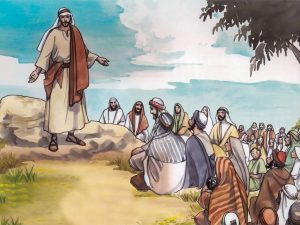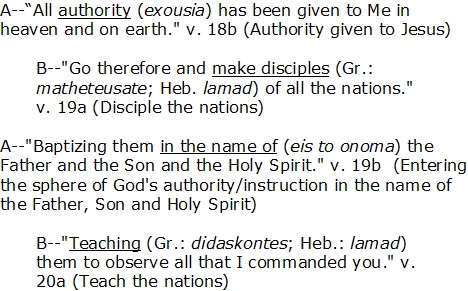

Explaining the Chiasm
In verse 18b, Jesus asserts that all authority has been given to him, both in Heaven and on Earth. The word translated as authority is the Greek, exousia, a combination of two words–ex, meaning “out of” and ousia meaning “being.” Together, it literally means “out of being” in the sense of something being “sent out.” Out of being implies the existence of an “origin” or source that possesses the liberty to act as it sees fit, the inherent right to make decisions, the ability to exercise power or rule over something or someone as it would please itself to do so. Importantly, exousia, that is, authority, can be conferred, transferred or delegated from one person (the origin or source) to another. The phrase spoken by Jesus–“authority has been given”–indicates that authority was conferred to him by another–that is, by God. Twenty chapters earlier, Jesus had an encounter with a centurion–a commander in the Roman army. In the course of discussion, the centurion mentioned that he, like Jesus, was a man “under authority.” He was at once “under the authority” of another, and in turn, his soldiers were under his authority. Each was bound to the other by a “trusting obedience“–“I tell this one, ‘go,’ and he goes; and that one, ‘come,’ and he comes. I say to my servant, ‘do this,’ and he does it.” (Matthew 8:9) The expression, “under authority,” is an English translation of the Greek, “hupo exousian tassomenos.” The Greek word “tasso” refers to an “ordered arrangement“–the centurion had a place in a chain of authority. Each person in the chain, from the highest officer to the lowest foot soldier, knew their “place” and their responsibility, and did what they were told. By this, order was established and maintained.
If we now look at verse 19, the person who is baptized–that is, initiated–into the sphere of God’s authority–that is, the Kingdom of God–also enters an “ordered arrangement.” The authority in this sphere emanates from a source, a trio of names in this case–Father, Son and Holy Spirit. And the entrant operates “in the name of” that source. “In the name of” is, in Greek, “eis to onoma,” and the one who acts in the name of another comes under the authority of the one who bears the name–for instance, the “ordered arrangement” of a disciple to his master, for instance, the Son–whereby the disciple adopts the mindset of his master, the ways (that is, the lifestyle) of his master, living according to the will and instructions of his master. And when he does this, he becomes the representative of his master, a representation to others of the master, such that when they see him, they see the master in him–in this case they see Christ in him, they discern in him the divine image. A disciple is the carrier of the divine image. This is what this verse means when it uses the phrase “eis to onoma,” in the name of.
What exactly does the person do who enters this “ordered arrangement?” There is a word in this verse that we routinely “gloss over” that may provide needed insight. That word is “Go.” It translates the Greek word, poreuthentes. “Go” would seem a very straightforward command, and when seen through an “evangelical paradigm,” it seems to command us to evangelize, “to bring people to a belief in Jesus.” If this word, however, was in an imperative or command form, Matthew would have used the Greek, poreutheti. Looking again at chapter 8, when Matthew told the story of the centurion who told his soldiers to “go,” he used the imperative form, poreutheti . Here in chapter 28, he instead used poreuthentes–it is expressed in the aorist-passive-participle form, most likely meaning “having gone.” Having gone to do what? The Hebrew that corresponds to “go” or “gone” is halak, meaning “walk.” Walking in Hebrew is intimately tied to “walking in the way” or according to the instructions of God. The entire trajectory of the Book of Matthew is the story of disciples walking in the instructions of Jesus for three years. What Jesus is telling His disciples in this passage is this: “Having walked in the ways of God, therefore. . .” As we will see, this is consistent not only with the context of Matthew as a whole, but with the literary structure of verses 19 and 20 in particular.
What exactly does it mean to be a disciple? Assuming, for the moment, that you are “baptized in the name of the Father, the Son and the Holy Spirit,” what are you being ordered to do? Beyond the word, poreuthentes, we find “make disciples (matheteusate) of all the nations.” The word, matheteusate, is translated in many, if not most, Christian Bibles by the expression “make disciples.” The Greek for disciple is mathetes, a noun. Matheteusate, on the other hand, is a verb in the second person. It doesn’t “point toward” the end product of discipling, the mathetes, but rather points toward the person doing the discipling, in this case the disciples to whom Jesus is speaking, the men who have walked with him for the past three years. Instead of reading “make disciples of all nations” we might instead read, “disciple all nations.” What you do first, having walked, is disciple yourself, before setting out to do the same for someone else. Oswald Chambers once said: “You cannot make disciples unless you are a disciple yourself.” Jesus is speaking to a group of men who have already “gone” or walked with Him for three years. These are not new “believers” who are being launched into their communities to “bring people to a belief in Jesus,” or “invite people to church.” These are men who have been under the guidance of Jesus for three years. They are being commissioned to instruct others, to pass along the instructions of Jesus to others. There is no equivalency to what they’re being told to do, or even the walk they have walked, vis-a-vis an “untrained believer” who recites the “sinner’s prayer” and is told to invite others to church. These men walked a long way with Jesus before they believed.
What then does it mean to disciple? The Hebrew word for disciple is talmiyd, a noun whose verbal root is lamad meaning “to teach,” a word identical to a Hebrew letter, lamed, consisting of the same consonants. It also means “to learn,” so that when we see this word, it signifies that those who teach must first learn. When we arrive at verse 20, Jesus states: “Teaching them to observe all that I commanded you.” Therefore, when we look at verses 19a and 20a Hebraically, we see repeating words–“Go (having walked) therefore and disciple all nations” (lek v’ lamad kol ha-goyim) and “teach them to observe all that I have commanded you.” (lamad shamar ha-debarim) To teach in Greek is didasko, and not surprisingly, the Hebrew word that corresponds to that is lamad. What does it mean to teach? Didasko appears in its various forms around 220 times in the NT, arising from the word dao, which means to learn. Didasko addresses the imparting of knowledge, a dissemination of information from teacher to student. Abraham Joshua Heschel once said: “Greeks study in order to comprehend; the Hebrews study in order to revere.” The Greek concerns himself with intellectual comprehension; the Hebrew, on the other hand, concerns himself with matters of obedience. Jesus says in verse 20 that you will teach (lamad) others to “observe all that I have commanded you.”–in Hebrew, to observe the words (debarim) of God. The Hebrew for observe is shamar. This word is found 469 times in Scripture, and in reference to God’s instructions, His Torah, it means to “keep” them, as in a teaching presented recently by Pastor Aris Tolentino from the Book of Joshua in which God instructs Joshua: “This Book of the Law (sefer Torah) shall not depart from your mouth, but you shall meditate on it day and night, so that you may observe to do (shamar asah) according to all that is written in it. For then you will make your way prosperous, and then you will have good success.” (Joshua 1:8) What the master teaches, the disciple observes and does and puts into practice. In terms of literary structure, the words “observe all” in line 20a stand in parallel with “having walked” in line 19a.
Other teachers of Jesus’ day had disciples. Among the Jews, this statement was given to prospective disciples: “Let your home be a meeting-house for the sages, and cover yourself with the dust of their feet, and drink in their words thirstily.” (Avot 1:4) One followed one’s sage, his master, so closely, emulating the master’s every behavior, copying him, becoming a representation of him, carrying his model of behavior into the next generation of disciples, that the disciple metaphorically became covered in the master’s dust. In the context of 1st Century Judaism, this is what it meant to be a disciple. And this is exactly what Jesus is speaking of in what we call “The Great Commission.”
Soren Kierkegaard, the Danish philosopher and theologian, once said: “Christ did not appoint professors, but followers. If Christianity … is not reduplicated in the life of the person expounding it, then he does not expound Christianity, for Christianity is a message about living and can only be expounded by being realized in men’s lives.” We as human beings were given our charge from God from the very beginning–we were created in the image of God–tselem Elohim. We were created to be God’s representative, maintaining order on the Earth. The word, tselem, is used in Scripture to depict idols, representations of gods. Yet, it also depicts us when we adopt God’s mindset, His ways, doing His will. When we do that–when we disciple–others see the divine image in us. The word, tselem, is pictographically understood to mean “desire to control chaos.” The word, control, is represented by the lamed in the center of the word tselem. To control chaos on the Earth is to disciple it–to teach the mindset, ways and will of God to others by inculcating those ways in ourselves and modeling them for others.

All authority has been given me .. who gave him all authority. GOD Almighty. If Jesus claimed to God Almighty, that implies that the father and son are not, especially if Jesus has ALL authority. Why would God Almighty need the name of father. So. And holy spirit to baptize?
The concept of discipleship envisioned here is impartation of life, not propositional truths (Greek-oriented). The closest thing that comes to mind is mentoring. It is relational, intentional and a 2-way street. Mentoring is sorely lacking in the modern church today; this type of discipleship has been replaced by entertainment.